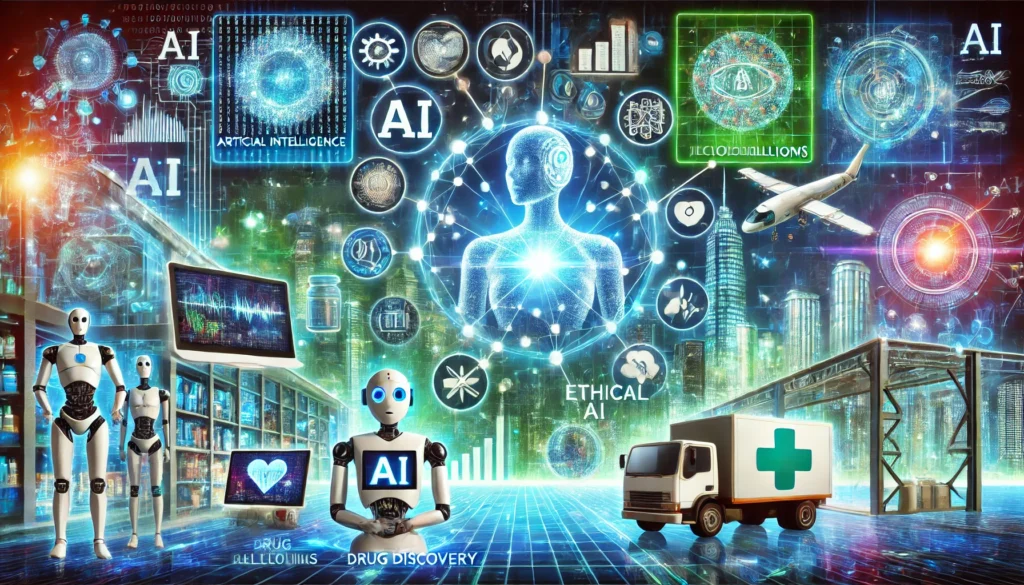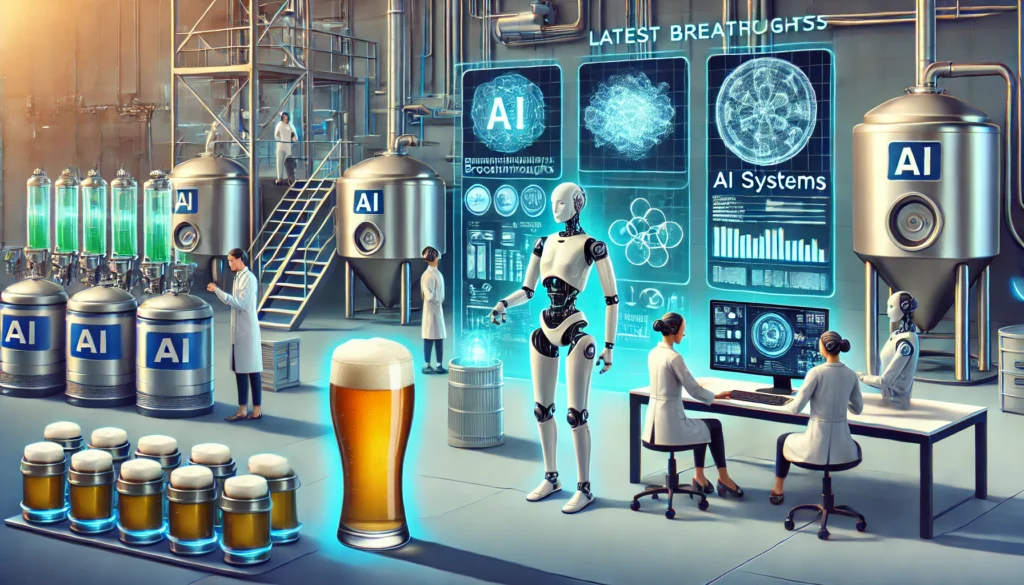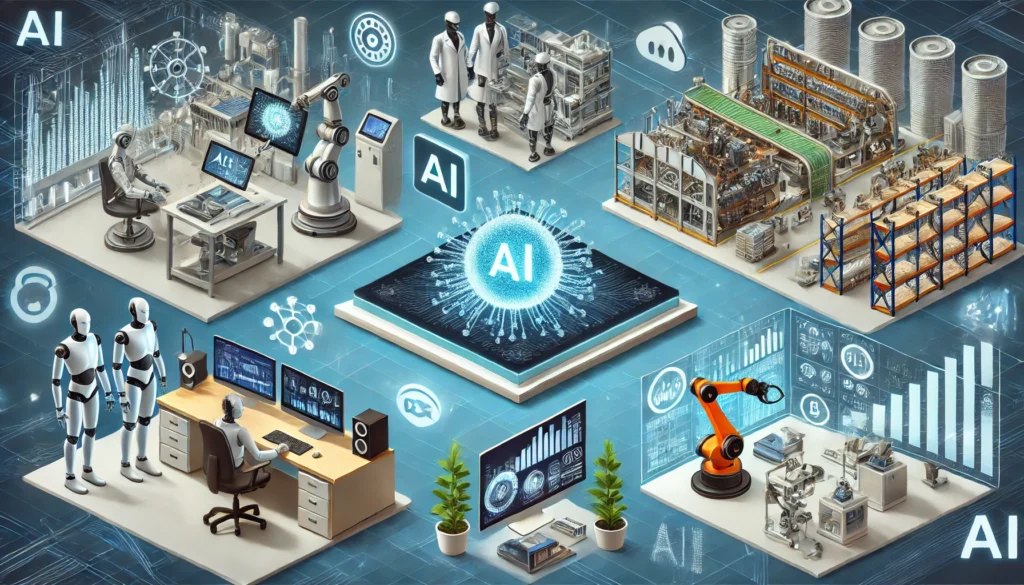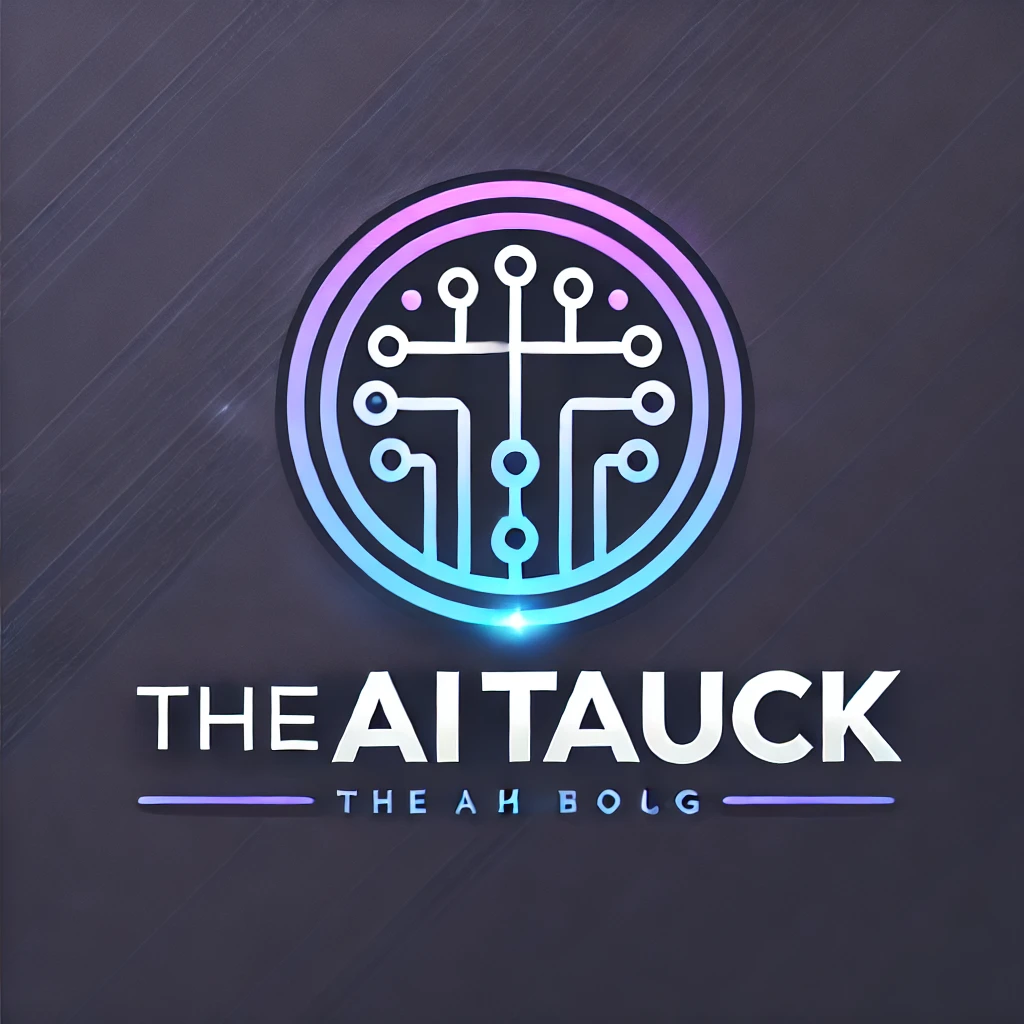Artificial Intelligence: Shaping Our World, One Breakthrough at a Time 🌐🤖

In the ever-evolving landscape of technology, Artificial Intelligence stands out as a beacon of innovation and transformation. From mimicking human vocal tracts to revolutionizing drug discovery, AI’s impact is felt across industries and disciplines. But as we marvel at these advancements, we must also grapple with the ethical implications and regulatory challenges they bring. Are we prepared for the future that AI is rapidly ushering in?
Join us as we dive into the latest AI breakthroughs, explore its applications in various sectors, and examine the critical considerations surrounding its development and deployment. From the labs of MIT to the warehouses managed by autonomous drones, we’ll uncover how AI is reshaping our world and what it means for you. Buckle up for a journey through the fascinating realm of AI, where we’ll navigate the cutting-edge developments, industry transformations, ethical dilemmas, policy landscapes, and glimpse into the future of this game-changing technology.
+ Add Section
Latest AI Breakthroughs
Groundbreaking AI models

Recent advancements in AI have led to the development of groundbreaking models that are transforming various industries. One notable trend is the emergence of AI robots capable of learning through observation. These robots can autonomously perform tasks by mimicking human actions, as demonstrated by Nvidia. This technology has significant potential in caregiving, especially in countries like Japan facing caregiver shortages due to aging populations.
Another innovative application is in beer brewing, where IntelligentX utilizes AI to enhance the brewing process. By processing customer feedback through an interactive bot, brewers can refine their products based on consumer preferences.
Advancements in natural language processing

Natural language processing (NLP) has seen significant improvements, with AI-powered chatbots becoming increasingly sophisticated. These advancements are particularly evident in the financial technology (FinTech) sector, where AI is streamlining operations and enhancing customer service.
| Application | Benefits |
| Chatbots | Improved customer service |
| Fraud detection | Enhanced security |
| Operations streamlining | Increased efficiency |
Breakthroughs in computer vision
Computer vision has made remarkable strides, particularly in medical imaging and diagnostics. AI is now being employed to train machines in interpreting x-rays, including those of rare conditions. This is achieved through a combination of real and computer-generated images, significantly improving diagnostic accuracy.
- Enhanced industrial automation
- Improved medical diagnostics
- Advanced automotive applications (e.g., autonomous vehicles)
These breakthroughs in computer vision are not limited to healthcare. The automotive sector is experiencing rapid growth in autonomous vehicles, with projections indicating a significant increase in their use by 2030. This development aims to reduce carbon emissions associated with transportation.
Now that we have covered the latest AI breakthroughs, we’ll explore how these advancements are being applied across various industries in the next section, “AI in Industry.”
+ Add Section
AI in Industry
Now that we’ve explored the latest AI breakthroughs, let’s dive into how AI is transforming various industries. The impact of artificial intelligence is far-reaching, revolutionizing operations across multiple sectors.
Healthcare Innovations
AI is making significant strides in healthcare, enhancing patient outcomes and operational efficiency:
- Medical imaging analysis
- Personalized treatment plans
- Electronic health record (EHR) analysis
- Fraud detection
- Remote patient monitoring
Companies like Greenlight Guru and PathAI are at the forefront, leveraging AI for diagnostic support and drug discovery.
Financial Sector Applications
The banking and finance industry is harnessing AI for:
- Fraud prevention
- Credit scoring
- Regulatory compliance
- Algorithmic trading
Firms such as Kensho Technologies and Gradient AI are leading innovations in automation and financial analysis.
Manufacturing and Automation
AI is transforming manufacturing processes through:
- Defect detection
- Quality control
- Predictive maintenance
- Process optimization
| AI Application | Benefit |
| Robotics | Increased production efficiency |
| Predictive Analytics | Reduced downtime |
| Automated Quality Control | Improved product quality |
Companies like Machina Labs exemplify the integration of AI in automated manufacturing solutions.
Retail and Customer Service
In retail and e-commerce, AI enhances customer experiences through:
- Personalized recommendations
- Dynamic pricing
- Inventory management
- Customer service chatbots
Instacart and other companies utilize AI to optimize operations and improve user experiences.
As we’ve seen, AI is deeply embedded in various industries, driving innovation and efficiency. With these advancements, it’s crucial to consider the ethical implications of AI implementation, which we’ll explore in the next section on Ethical Considerations in AI.
+ Add Section
Ethical Considerations in AI
Now that we have explored the impact of AI in various industries, it’s crucial to examine the ethical considerations surrounding this powerful technology. As AI continues to shape our world, we must address the challenges it presents to ensure its responsible development and deployment.
A. Bias and fairness issues
AI systems are only as objective as the data they’re trained on, and inherent biases in this data can lead to unfair outcomes. Political philosopher Michael Sandel warns that AI, often perceived as impartial, can perpetuate existing societal biases. This is particularly concerning in critical areas such as:
- Parole decisions
- Employment practices
- Financial services
Karen Mills echoes this concern, noting that AI’s learning from flawed datasets can replicate discriminatory practices, especially in the financial sector. To address these issues, it’s crucial to:
- Implement rigorous data curation processes
- Conduct ongoing monitoring of AI systems
- Ensure diverse representation in AI development teams
B. Privacy concerns
As AI technologies advance, the line between security and surveillance becomes increasingly blurred. Key privacy issues include:
| Concern | Potential Risk |
| Unauthorized data collection | Violation of personal privacy |
| Electoral interference | Manipulation of democratic processes |
| Data misuse | Exploitation of personal information |
The implementation of regulations like GDPR and CCPA aims to protect individual privacy rights. However, as AI capabilities grow, so does the need for more comprehensive and adaptive privacy protection measures.
C. Job displacement debates
While AI promises increased efficiency and productivity, it also raises concerns about potential job losses. The impact of AI on employment is complex and multifaceted:
- Traditional sectors may experience job displacement
- New opportunities are emerging in AI-related fields
- Collaboration is needed among various stakeholders to facilitate workforce transition
To address these challenges, experts recommend:
- Investing in education and retraining programs
- Encouraging lifelong learning to adapt to evolving job markets
- Developing policies that support workers during transitional periods
With these ethical considerations in mind, we must now turn our attention to the crucial topic of AI policy and regulation. As AI continues to evolve, it becomes increasingly important to establish clear guidelines and oversight mechanisms to ensure that its development aligns with our societal values and priorities.
+ Add Section
AI Policy and Regulation
Now that we’ve explored the ethical considerations in AI, let’s delve into the equally crucial realm of AI policy and regulation. As AI technologies continue to advance rapidly, governments and organizations worldwide are striving to establish frameworks to govern their development and use.
A. Recent government initiatives
The United States has been at the forefront of developing AI governance policies. Key initiatives include:
- Obama administration’s 2016 report on AI’s future
- Trump administration’s American AI Initiative
- Biden administration’s 2022 Blueprint for an AI Bill of Rights
These policies focus on principles such as:
| Principle | Description |
| Safety | Ensuring AI systems are safe for public use |
| Non-discrimination | Preventing bias in AI decision-making |
| Data privacy | Protecting individual privacy in AI applications |
Congress has also taken steps to address AI governance through legislation:
- National AI Initiative Act of 2020
- Proposals for enhancing transparency in AI-driven political advertising
Federal agencies like the Federal Trade Commission (FTC) and the National Institute of Standards and Technology (NIST) are actively working to establish AI standards and address associated risks.
B. International AI governance
Global efforts to harmonize AI legislation are underway, with organizations such as the OECD and UNESCO leading the charge. The International Association of Privacy Professionals (IAPP) offers resources to track these developments:
- AI Law and Policy Tracker: Monitors legislative developments across multiple jurisdictions
- US State AI Governance Legislation Tracker: Focuses on state-level AI regulations
These tools help professionals navigate the complex landscape of international AI governance and identify emerging trends in regulatory approaches.
C. Corporate AI policies
As governments work on regulations, corporations are also developing their own AI policies. Key areas of focus include:
- Responsible AI use
- Prevention of discrimination
- Transparency in AI-driven processes
- Consumer protection against AI-related fraud
Many companies are implementing AI audits to evaluate their usage and ensure compliance with emerging regulations. The IAPP provides resources and training programs to help organizations develop and implement effective AI governance frameworks.
With this comprehensive overview of AI policy and regulation, we can now turn our attention to the exciting prospects that lie ahead in the future of AI.
+ Add Section
Future of AI
Now that we have covered the complex landscape of AI policy and regulation, let’s turn our attention to the future of AI and its potential impacts on society and technology.
Emerging AI trends
As we look towards the future, several key AI trends are emerging:
- Agentic AI: Autonomous systems capable of independent decision-making
- Multimodal AI: Integration of various input types (text, images, sound)
- Open-source AI: Democratizing access to powerful models
- Retrieval-augmented generation (RAG): Enhancing reliability of AI-generated content
These trends are reshaping how AI is developed and applied across industries. For instance, multimodal AI is enabling more intuitive search and content creation tools, while agentic AI holds promise for environmental monitoring and financial management.
Potential societal impacts
The integration of AI into daily life is expected to have significant societal impacts:
| Impact Area | Potential Effects |
| Workplace | Automation of repetitive tasks, freeing human resources for creative work |
| Healthcare | Advanced diagnostic tools, accelerated scientific discoveries |
| Environment | Improved climate change predictions, agricultural assistance |
| Education | Democratization of AI skills through online platforms |
However, these advancements also raise concerns about data manipulation, misinformation, and privacy risks, necessitating careful consideration of ethical implications.
AI research frontiers
Research in AI is pushing boundaries in several areas:
- Efficiency: Development of smaller, more efficient models to address GPU shortages and rising cloud costs
- Customization: Creation of tailored enterprise generative AI models for specific industry needs
- Ethics and security: Focus on transparent and responsible AI development practices
- Governance: Exploration of frameworks to manage “shadow AI” and foster innovation
Integration with other technologies
AI’s future is closely tied to its integration with other technologies:
- Virtual agents: Combining agentic and multimodal AI for complex task execution
- No-code development: Simplifying application creation through AI-powered tools
- Cybersecurity: Enhancing security analytics while addressing AI-related vulnerabilities
- Scientific research: Accelerating discoveries in fields like climate science and medicine
As AI continues to evolve, its integration with various technologies will likely lead to transformative applications across multiple sectors, reshaping how we work, communicate, and solve complex problems.
+ Add Section
Conclusion
The rapid advancements in AI technology are reshaping industries and society at an unprecedented pace. From innovative AI models mimicking human vocal tracts to autonomous drones revolutionizing warehouse management, the potential applications seem boundless. However, as we’ve explored, these developments come with ethical considerations and the need for robust policy frameworks to ensure responsible AI deployment.
As we look to the future of AI, it’s clear that collaboration between researchers, industry leaders, and policymakers will be crucial. The investments being made by tech giants and the emergence of new players in the field underscore the growing importance of AI in our daily lives. It’s up to us to stay informed, engage in discussions about AI’s impact, and advocate for its ethical development to harness its full potential for the benefit of society.
